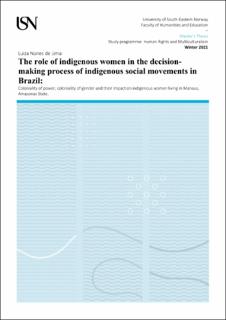The role of indigenous women in the decision-making process of indigenous social movements in Brazil: Coloniality of power, coloniality of gender and their impact on indigenous women living in Manaus, Amazonas State
Abstract
Indigenous peoples worldwide are in a difficult situation because they continually face discrimination, marginalization, poverty, and conflict consequential to the European colonization process initiated in the 16th century. In Brazil, the indigenous peoples’ situation is critical. During the last decade (2010 – 2020), their lives and rights have been under escalating attacks. In the last couple of years, their situation has substantially worsened following the drafting and implementation of a series of legislative and administrative measures that significantly change the national indigenist policy, which further requires their social mobilization. In this context, this thesis explores the role of indigenous women living in the urban perimeter of Manaus, North Region of Brazil, in the decision-making process of indigenous social movements. For that, the thesis problematizes the participation of indigenous women through the concepts of coloniality of power, coloniality of gender, social justice, and recognition. A theoretical thematic analysis was applied to semi-structured interviews conducted with eight indigenous women who self-declared members of indigenous social movements. The thematic analysis revealed that indigenous women’s participation and influence in indigenous social movements are increasing in the urban context. However, they still face obstacles to insert gender-related matters into the agenda of broader indigenous movements. In this sense, using Fraser’s theoretical framework on recognition, the thesis argues that coloniality of power and coloniality of gender remain and directly affect the participatory parity of indigenous women (and indigenous peoples) and, thus, decoloniality through decolonial types of feminism is necessary to achieve social justice
Key-words: indigenous women, social movements, coloniality of power, coloniality of gender, social justice, recognition.
